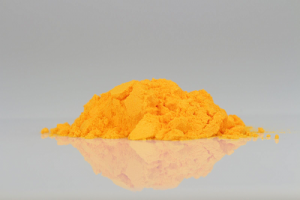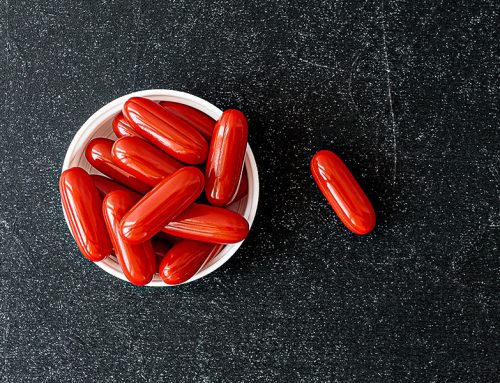
In its raw material form, Coenzyme Q10 consists of crystalline compounds. These crystals must be dissolved to single CoQ10 molecules to permit absorption. Only single CoQ10 molecules can be absorbed. CoQ10 crystals have poor dissolution within the chyme of the intestines because melting point of CoQ10 crystals is 10 degrees centigrade above body temperature. Thus, the absorption of the Coq10 supplement depends upon the manufacturer’s formulation, upon the solubility of the Coenzyme Q10 in the oil matrix.
Coenzyme Q10 is a naturally occurring vitamin-like bio-nutrient that is essential to the cellular process of ATP energy production. It is especially important for the optimal functioning of tissues with high energy requirements such as heart muscle tissues [Mantle 2015].
Beyond its role in cellular energy production, Coenzyme Q10 has the following important biological functions:
- In its reduced form, Coenzyme Q10 is a lipid soluble antioxidant that protects cell membranes from oxidative damage caused by harmful free radicals [Mantle 2015].
- Coenzyme Q10 improves endothelium-dependent vaso-dilation in patients with diabetes and in patients with coronary artery disease [Tiano 2007].
- In a meta-analysis of 17 RCTs, CoQ10 supplementation significantly reduces the blood levels of known bio-markers for systemic inflammation: C-RP, IL-6, and TNF-α [Fan 2017].
Bio-Synthesis of Coenzyme Q10 Declines with Age
The human body’s ability to synthesize Coenzyme Q10 peaks at some time in a person’s 20s and gradually declines thereafter [Kalén 1989]. Consequently, supplementation is necessary. It is not possible to make up the age-related loss of Coenzyme Q10 by eating more carefully.
Furthermore, certain drugs — statin medications in particular — are known to inhibit the body’s synthesis of Coenzyme Q10 [Okuyama 2015].
Absorption and Bio-Availability of the CoQ10 Supplement
There is considerable variability in the absorption and bio-availability of CoQ10 supplements. The CoQ10 raw material is a dry crystalline powder. The human digestive system cannot absorb CoQ10 crystals. To make absorption possible, the Coq10 supplement manufacturer must use a process that dissociates the CoQ10 crystals into single CoQ10 molecules.
- The formulation of the CoQ10 supplement – the composition of the oil matrix and the heating/cooling process – is much more important than the form – ubiquinone vs ubiquinol – is [Lopez-Lluch 2019].
- In a 2019 double-blind crossover study with four-week washout periods, researchers showed that a ubiquinone (oxidized CoQ10) preparation with a patented soybean oil composition and a specific heating and cooling process gave significantly better absorption than a ubiquinol (reduced CoQ10) preparation composed of medium-chain triglycerides and vitamin C [Lopez-Lluch 2019].

In a double-blind crossover study, Professor G. Lopez-Lluch and a team of Spanish university researchers have shown that the formulation of the Coenzyme Q10 supplement is more important to Coenzyme Q10 bio-availability than the form of the Coenzyme Q10 is. In the study, a well-formulated ubiquinone CoQ10 supplement was significantly better absorbed than a ubiquinol supplement was.
Heart Health Benefits of CoQ10 Supplements
In randomized controlled studies enrolling 400+ study participants, researchers reported significant reductions in death from heart disease associated with the CoQ10 treatment of chronic heart failure patients [Mortensen 2014] and senior citizens [Alehagen 2013].
- The Q-Symbio Study showed significant improvement of symptoms and survival in chronic heart failure patients given 3 times 100 milligrams of Coenzyme Q10 daily for two years. The patients in the CoQ10 adjunctive treatment group has a 43% lesser risk of death from heart disease than the patients in the placebo group did [Mortensen 2014].
- The KiSel-10 Study showed improved heart function on echocardiograms and a 53% lesser risk of death from heart disease among senior citizens in the active treatment group compared to the placebo group. The study participants in the active treatment group took 2 times 100 milligrams of Coenzyme Q10 and 200 micrograms of a selenium-enriched yeast preparation daily for four years [Alehagen 2013].
- In both studies, the CoQ10 preparation used was the ubiquinone CoQ10 preparation that tested best in the 2019 bio-availability comparison study [Lopez-Lluch].
Safety of Coenzyme Q10 Supplements
The safety of CoQ10 supplementation has been verified in some 200 clinical studies. Coenzyme Q10 is well-tolerated, it has no toxic or geno-toxic effects, and it cannot be over-dosed. Very rarely, an individual taking CoQ10 supplements may experience mild gastrointestinal discomfort [Mantle 2015].
CoQ10 Supplementation for Prevention and Treatment of Heart Disease
- The formulation of the CoQ10 supplement is decisivefor its absorption, its bio-availability, and its efficacy.
- Less expensive and undocumented CoQ10 supplements are likely to have a significantly lower absorption and bio-availability and thus negligible heart health effects.
- Contrary to misleading marketing claims, it is not necessary to take a ubiquinol supplement to get significant increases of ubiquinol in the blood and in the circulating lipoproteins. A good ubiquinone CoQ10 supplement will do the job [Mohr 1992].
- CoQ10 supplementation is affordable, effective, and safe. However, consumers should request documentation, in peer-reviewed journals, of the absorption and the efficacy of the CoQ10 supplement.
Read our key article about CoQ10 and cardiovascular health in elderly people
Read our key article on CoQ10 as adjuvant therapy for heart failure
Sources
Alehagen, U., Johansson, P., Björnstedt, M., Rosén, A., & Dahlström, U. (2013). Cardiovascular mortality and N-terminal-proBNP reduced after combined selenium and Coenzyme Q10 supplementation: a 5-year prospective randomized double-blind placebo-controlled trial among elderly Swedish citizens. International Journal of Cardiology, 167(5), 1860-1866. [PubMed]
Alehagen, U., Aaseth, J., Alexander, J., & Johansson, P. (2018). Still reduced cardiovascular mortality 12 years after supplementation with selenium and coenzyme Q10 for four years: A validation of previous 10-year follow-up results of a prospective randomized double-blind placebo-controlled trial in elderly. Plos One, 13(4), e0193120. [PubMed]
Fan L, Feng Y, Chen GC, & Qin LQ. (2017). Effects of Coenzyme Q10 supplementation on inflammatory markers: A systematic review and meta-analysis of randomized controlled trials. Pharmacol Res; 119: 128-136. [PubMed]
Kalén, A., Appelkvist E.L., Dallner G. (1989). Age-related changes in the lipid compositions of rat and human tissues. Lipids, 24(7):579–584. [PubMed]
Langsjoen PH & Langsjoen AM. (2014). Comparison study of plasma coenzyme Q10 levels in healthy subjects supplemented with ubiquinol versus ubiquinone. Clin Pharmacol Drug Dev; 3(1):13-7. [PubMed]
López-Lluch, G., Del Pozo-Cruz, J., Sánchez-Cuesta, A., Cortés-Rodríguez, A. B., & Navas, P. (2019). Bioavailability of coenzyme Q10 supplements depends on carrier lipids and solubilization. Nutrition, 57, 133–140. [PubMed]
Mantle D. (2015). Coenzyme Q10 to treat and prevent heart disease. British Journal of Cardiac Nursing; 10: 382-7. [PubMed]
Mohr, D., Bowry, V. W., & Stocker, R. (1992). Dietary supplementation with Coenzyme Q10 results in increased levels of ubiquinol-10 within circulating lipoproteins and increased resistance of human low-density lipoprotein to the initiation of lipid peroxidation. Biochimica et Biophysica Acta, 1126(3), 247-254. [PubMed]
Mortensen, S. A., Rosenfeldt, F., Kumar, A., Dolliner, P., Filipiak, K. J., Pella, D., & Littarru, G. P. (2014). The effect of coenzyme Q10 on morbidity and mortality in chronic heart failure: results from Q-SYMBIO: a randomized double-blind trial. JACC. Heart Failure, 2(6), 641-649. [PubMed]
Mortensen, A. L., Rosenfeldt, F., & Filipiak, K. J. (2019). Effect of Coenzyme Q10 in Europeans with chronic heart failure: A sub-group analysis of the Q-Symbio randomized double-blind study. Cardiology Journal, 26(2): 147-156. [PubMed]
Tiano L, Belardinelli R, Carnevali P, Principi F & Littarru GP. (2007). Effect of Coenzyme Q10 administration on endothelial function and extracellular superoxide dismutase in patients with ischaemic heart disease. Eur Heart J; 28(18): 2249-55. [PubMed]
N.B. The information presented in this review article is not intended as medical advice and should not be construed as such.









Leave A Comment